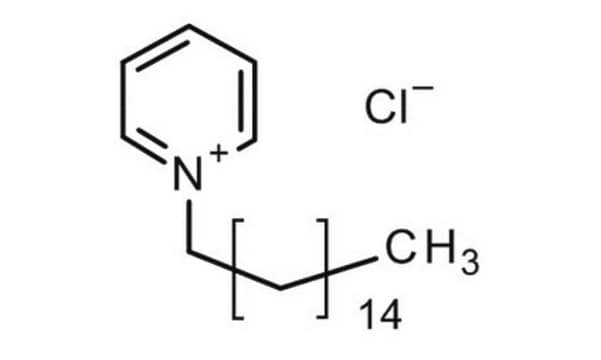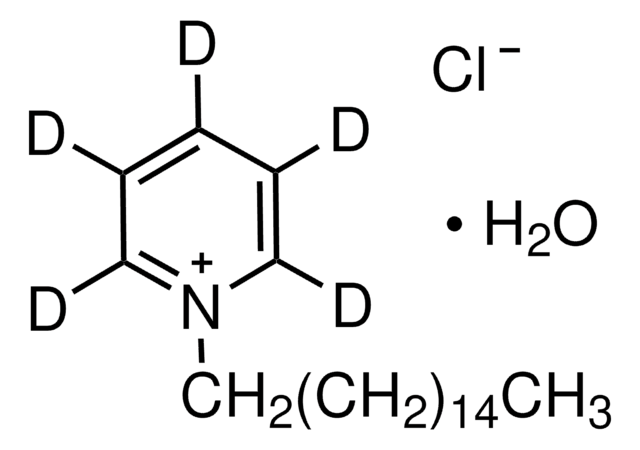C1000000
Cetylpyridinium chloride
European Pharmacopoeia (EP) Reference Standard
Synonyme(s) :
Cetylpyridinium chloride monohydrate, 1-Hexadecylpyridinium chloride, Hexadecylpyridinium chloride monohydrate
About This Item
Produits recommandés
Qualité
pharmaceutical primary standard
Famille d'API
cetylpyridinium
Fabricant/nom de marque
EDQM
Pf
83-86 °C (lit.)
Application(s)
pharmaceutical (small molecule)
Format
neat
Chaîne SMILES
O.[Cl-].CCCCCCCCCCCCCCCC[n+]1ccccc1
InChI
1S/C21H38N.ClH.H2O/c1-2-3-4-5-6-7-8-9-10-11-12-13-14-16-19-22-20-17-15-18-21-22;;/h15,17-18,20-21H,2-14,16,19H2,1H3;1H;1H2/q+1;;/p-1
Clé InChI
NFCRBQADEGXVDL-UHFFFAOYSA-M
Vous recherchez des produits similaires ? Visite Guide de comparaison des produits
Description générale
Application
Conditionnement
Autres remarques
Produit(s) apparenté(s)
Mention d'avertissement
Danger
Mentions de danger
Classification des risques
Acute Tox. 2 Inhalation - Acute Tox. 4 Oral - Aquatic Acute 1 - Eye Dam. 1 - Skin Irrit. 2 - STOT SE 3
Organes cibles
Respiratory system
Code de la classe de stockage
6.1A - Combustible acute toxic Cat. 1 and 2 / very toxic hazardous materials
Classe de danger pour l'eau (WGK)
WGK 3
Point d'éclair (°F)
Not applicable
Point d'éclair (°C)
Not applicable
Choose from one of the most recent versions:
Certificats d'analyse (COA)
Sorry, we don't have COAs for this product available online at this time.
If you need assistance, please contact Service Clients
Déjà en possession de ce produit ?
Retrouvez la documentation relative aux produits que vous avez récemment achetés dans la Bibliothèque de documents.
Les clients ont également consulté
Notre équipe de scientifiques dispose d'une expérience dans tous les secteurs de la recherche, notamment en sciences de la vie, science des matériaux, synthèse chimique, chromatographie, analyse et dans de nombreux autres domaines..
Contacter notre Service technique








